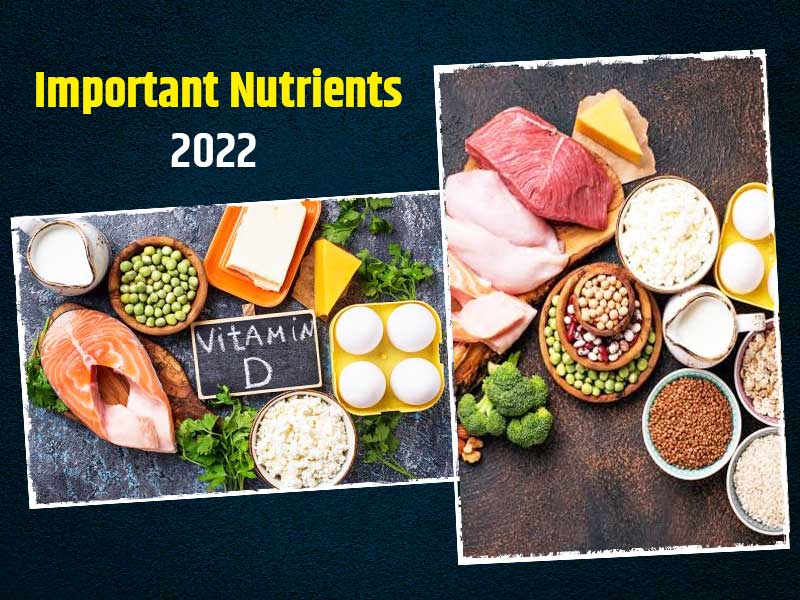
Want to start new year on a strong note? You can make a new year resolution to get enough of all the essential nutrients. Nutrients can help in supporting good overall health across lifespan. It also helps in boosting immunity, brain development, muscle mass and strength, bone health and much more. Onlymyhealth editorial team talked to Dr. Irfan Shaikh, Head Adult Nutrition, Scientific & Medical Affairs, Abbott's Nutrition business, about the important nutrients to stay strong in the year 2022.
Table of Content:-
Nutrients to stay strong in 2022
According to Dr. Irfan, the nutrients and foods that can be consumed to keep the nutritional levels on track are:
1. Protein

Protein helps in providing the building blocks for every cell in the body such as muscles, bones, hormones, antibodies, etc. Having 0.8 to 1g/kg body weight of high-quality protein in a day promotes body build muscle and can help in keeping you fuller for longer hours between meals. Eggs are a rich source of protein, but foods including chickpeas, cottage cheese, quinoa, greek yogurt, dairy, dairy products, peanuts, and almonds can also help in increasing your protein intake.
2. DHA Omega-3
DHA Omega-3 is a unique fat present in seafood, provides nourishment to your brain and improves eyesight. Fatty fish is a good dietary source of omega 3. You can also enhance your omega 3 fatty acid intake by consuming plant-based foods, such as green leafy vegetables, nuts and seeds. For vegetarians, the recommended foods are seaweed, nori, spirulina, and chlorella. These are various forms of algae that most people consume for their several health benefits.
Also read: 5 Nutrients That Are A Must For The Winters
3. Choline
The brain and nervous system are dependent on choline for memory, mood, and muscle control. However, most of us do not eat enough amount, especially pregnant women, who require extra choline for their child's development. The primary dietary sources of choline consist mainly of animal-based food including meat, poultry, fish, dairy products, and eggs.
4. Calcium
Did you know that 99% of the body's calcium is found in bones and teeth? Thereby, this mineral is a vital part for good bone and dental health. Calcium also helps in muscle contraction, treating blood clotting and in brain and nerves communication with each other. Dairy products such as milk, yogurt, and cheese are the best calcium rich food sources. Moreover, you can even incorporate non-dairy foods, including tofu, leafy greens, and beans. These food items can be added to your diet on an everyday basis to keep an optimum calcium intake.
5. Vitamin D

Vitamin D is a multipurpose nutrient that helps our bodies in absorbing calcium and it make your immune system stronger. It is easy to take vitamin D through sunlight, which is also called ‘sunshine vitamin’ and it can be found in foods as well. There are many foods that are naturally rich in vitamin D3. Some of the good vitamin D sources are flesh of fatty fish, fish liver oils, egg yolks, orange juice and cheese.
Also read: Myths And Facts Of Nutrition Supplement Consumption
6. Zinc
Zinc keeps the immune cells strong and healthy and also helps in quick wound healing. Zinc is an essential nutrient for proper growth and development, particularly during childhood, teenage, and pregnancy. Meat is a rich source of zinc, and especially red meat. For vegetarians, food such as chickpeas, lentils and beans can be consumed for good amounts of zinc. Seeds are also a healthy option to add in your diet and can help increase your zinc intake.
7. Selenium
Selenium plays the role of an antioxidant nutrient that protects cells from damage caused by free radicals. This mineral is also crucial for reproduction and proper thyroid function. Both milk and yogurt contain around 8 mcg of selenium per cup, or 11 percent of your daily requirements. Besides this, there are bananas, cashews, lentils, and spinach that are full of this nutrient.
8. Vitamin A
Vitamin A is known as the "anti-infective vitamin", as it keeps the skin, mouth, stomach, and lungs healthy so that they can combat infection in a better way. This vitamin is also important for good vision. You can have it with some fat for proper absorption. Foods such as sweet potato, pumpkin, carrots, and spinach are good sources of Vitamin A.
9. Vitamin E

Vitamin E is also an essential nutrient as it helps your body in fighting away free radicals and supports a healthy immune response. Vitamin E is a common nutrient present in most of the foods. Vitamin E rich sources are cooking oils, seeds, and nuts.
Also read: Want To Have A Disease-Free Life? Follow These Tips By Nutritionist
10. Vitamin C
Vitamin C plays the role of an antioxidant which protects cells from damage. It also helps in preventing anemia by helping the body absorb more iron through plant food sources. Oranges are the best source for Vitamin C requirements. However, apart from this, certain foods are loaded with Vitamin C, including kiwis, strawberries, broccoli, tomatoes, cauliflower, and red bell peppers.
11. Fluids and Electrolytes
Never forget to load up on fluids. They hydrate your body, including joints, keeping cells and tissues healthy, eliminating waste products and managing body temperature, especially if you are sick. Taking liquids that contain electrolytes such as sodium, potassium and chloride is beneficial for the body to hold on to fluids for improved hydration. There are a number of foods and drinks that contain electrolytes, such as leafy green vegetables (spinach, kale and fruits like bananas, prunes, and dried apricots). Besides this, beans, lentils, nuts, sand seeds also contain a good amount of electrolytes.
Image credits: Freeepik
Also watch this video
How we keep this article up to date:
We work with experts and keep a close eye on the latest in health and wellness. Whenever there is a new research or helpful information, we update our articles with accurate and useful advice.
Current Version